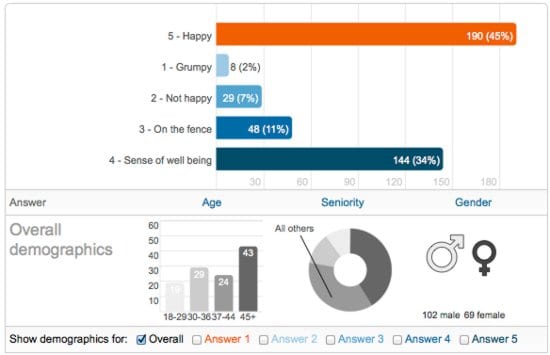A few weeks ago, I decided to run a LinkedIn poll after reading Daniel Nettle’s book Happiness – the science behind the smile.
I enjoyed it and found it easy to “consume”. One thing I discovered was that we all “sense” happiness differently, while our environment could be a contributor to what we consider happiness.
Even the notion of thinking about happiness can change our experience of life. So I asked the question “All things being considered, do you feel happy?” The comments chastising me for the completely unscientific nature of the poll completely missed the point.
Take a moment to “consider” happiness.
Go on, do it now just for fun…[insert thinking time].
Most people take the time to realise that the sun is shining, they are healthy, they have food and lodging for their family. All of a sudden, life doesn’t look so bad.
I wanted 10,000 people to fill in the poll – not because it would make it any more statistically worthwhile – but because 10,000 people would have taken a moment to think about happiness. As a result of taking the poll, they would have felt happier – and happiness is infectious.
Oh well, at least I made a difference to the 419 voters and the people who wrote the 44 comments. And only eight people claimed to be grumpy.
In the book Nettle applied a scale to the happiness experience:
Level one – momentary feelings such as joy or pleasure.
Level two – judgements regarding feelings of well being and satisfaction.
Level three – the quality of life we experience, such as flourishing or fulfilment of one’s potential.
What I am particularly interested in is not so much those moments of joy or pleasure that might be fleeting or pass quickly (as per the poll), but rather the sustained experience of a satisfied life. Of creating practices for ongoing well-being.
Life is imperfect and total bliss is not a reality. There is no such thing as Utopia – life is challenging – but we do have the power to influence how we accept those challenges and view the world. As humans, we have the power of choice.
It is liberating to know that life is full of disappointments and struggles for everyone, so we can give up our anxiety about everyone having a better time than us.
Happiness is a choice. A growing body of research is demonstrating that as we become happier, we become better people. As we become happier we become more compassionate, creative, energetic and financially successful. We also become more emotionally and physically healthy.
For those of us who are concerned with creating a “better” world, becoming happier and helping others become happier appears a very effective means to this end. Which is why I believe being thankful is easy option on the happiness journey.
A shame I did not move the happiness index by touching 10,000 people with my blog – but I will continue to encourage people to say ‘Five Thanks a Day.’



